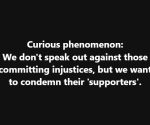The Suspect
About the law
~ The Suspect (4) ~
By Cor Merx, attorney at law
From last week’s explanation about how difficult it is to identify someone as a suspect, today we will have a look at the process of handling a suspect.
Let’s begin with a better definition to understand each other. I will name this period the pre-trial period. I mean to say, this is the period a suspect can be held in detention until his case (ultimately) comes to court. According to the law the term pre-detention is not correct but I want to explain a system and not legal terms. I am a Master in Law and not a master at school.
In the law we have several moments where you could be a suspect or are just becoming a suspect. We call it in Dutch: “staande houden.” In English the best translation would be: to stop persons in order to establish their identity.
This possibility for the police to hold you looks prima vista very innocent; it can be done for an offense but also for a (serious) crime (so for parking in the wrong way and committing a murder). Please be aware that the Officers of the Customs do have more possibilities to ask for information. A special chapter is the possibility for the tax-officer (I will come back on this at a later time).
How can the police let you know that they have some questions for you? The most frequent way is the traffic control where you get a sign to put the vehicle on the side of the road. They will start to ask for the license. At that time they have your identity in one shot. They also can stop you by talking to you as a pedestrian walking on the Front Street to show your ID.
If the police ask you to stand still (the Original word for “staande”) are you then allowed to tell the police officer to follow you when you continue talking and driving (like in the movie Miami Vice) the car? In my opinion the law does not say anything on that point about how “still you have to stand”. In other words if you do not halt you cannot be charged for ignoring the order of a police-officer at that point.
But if a police officer says that they have to stop and really hold the car or you (physically) it becomes a different story. Trying to free yourself from that situation (by driving off or running away) is punishable by the law as a crime. It seems strange: parking your car the wrong way and refusing to stand still are two charges; for parking the wrong way it’s about a $50 fine and the other one is a crime with jail time. So be careful.
There is some confusion about “staande houden” if you leave the country or a criminal marshal is stopping you to order you pay an outstanding criminal sentence. For instance: if you have been sentenced by the court (e.g. in Rotterdam in absence), there will be a verdict available. In the vocabulary of prosecutors you are “in the book”. It means the police or the immigration officers are aware that you have to pay for the outstanding Judgment. This happens very often to people who travel via Schiphol airport.
I heard from a celebrity in Sint Maarten that he went over the speed-limit and was sentenced in absence. When he wanted to leave Holland he first had to pay the outstanding.
My tip: do not pay anything and they cannot keep you “staande” for these kind of things. Just tell the officer that you were not aware of it (and most of the time that is the truth) and that you want to appeal it. They have to let you go because the verdict is still available to be appealed (and do not do as the celebrity did: Beg other travelers to help him pay the judgment. You will be in the papers before you reach Sint Maarten).
There is another example of “staande houden.” That is the “invitation” to come to the police or the tax-office to be questioned as a suspect or as a witness. It often happens that you are invited and go there voluntarily and then the officer tells you that you are a suspect and that you have been arrested (and put behind bars).
They would not say that it is not allowed but your defense lawyer should make an issue out of it in the court case. Because you have the discrepancy what lawyers always have: that one says yes and the other says no? But in Holland the Ombudsman found it “careless” (onzorgvuldig) to act this way.
Next week we will discuss the real arrest or aanhouding.
Cor Merx
























